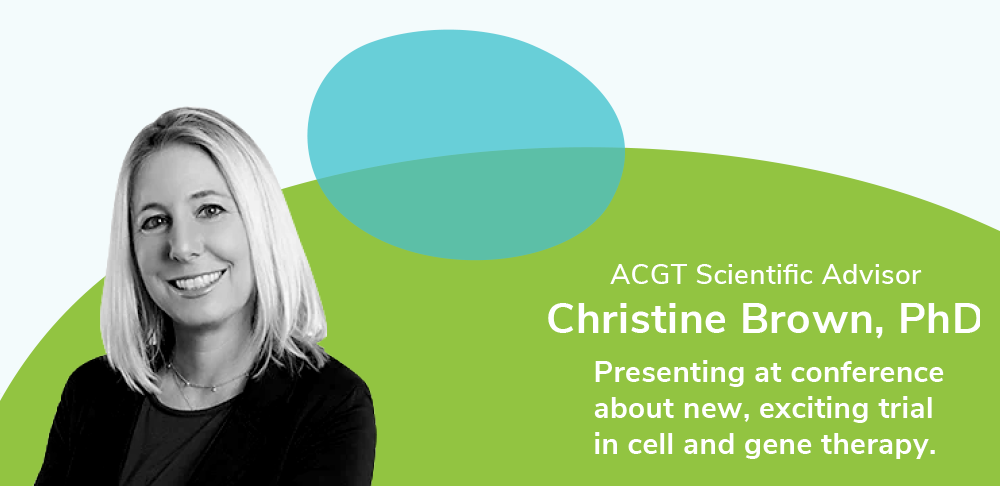
The future of cancer treatment will likely involve combination therapy: the pairing of several approaches together into one multi-pronged attack on tumors.
One combination involves two types of cancer cell and gene therapy acting as a potential anticancer force – particularly for the difficult-to-treat glioblastoma.
Christine Brown, PhD, City of Hope and a member of the Alliance for Cancer Gene Therapy Scientific Advisory Council, is leading a planned phase 1 clinical trial combining CAR T-cell therapy with an oncolytic virus to treat glioblastoma.
Mustang Bio, a clinical-stage biopharmaceutical company, is developing the combination therapy and sponsoring the phase 1 study.
The combination study is supported by two separate phase 1 clinical trials testing each therapy:
- CAR T-cell therapy, developed by Dr. Brown, at City of Hope
- Oncolytic virus, developed by Kevin Cassady, MD, at University of Alabama’s Nationwide Children’s Hospital
The investigators and Mustang Bio hope that the clinical data from those trials will support the first-ever industry-sponsored trial of an oncolytic virus with CAR T cells for cancer treatment.
Dr. Brown, the Deputy Director of the T Cell Therapeutics Research Laboratory at City of Hope National Medical Center, will present this exciting development at the annual American Association for Cancer Research (AACR) meeting. The conference is scheduled for April 8-13, 2022, in New Orleans, Louisiana. Dr. Brown will present during the 9 a.m. session on April 13 (Wednesday). She recently was a keynote speaker at the IO-360 conference, which Alliance for Cancer Gene Therapy grant recipient and Researcher Joseph Fraietta, PhD, also spoke at.
Dr. Christine Brown’s CAR T-cell therapy for glioblastoma
CAR T-cell therapy is a novel immunotherapy where doctors remove a patient’s T cells and add a chimeric antigen receptor (CAR) to the cells. This receptor focuses the T cells on looking for cancer cells featuring a specific antigen (protein) receptor.
Dr. Brown’s IL-13Rα2 CAR T cells led to a durable complete response in a 54-patient phase 1 clinical trial for glioblastoma. IL-13Rα2 is a highly expressed protein antigen in most cases of glioblastoma, making it a target for CAR T-cell development.
Alliance for Cancer Gene Therapy previously reported that Dr. Brown is leading this clinical trial, which focuses on CAR T-cell therapy for glioblastoma. The study administers the CAR T cells intracranially to bypass the blood-brain barrier and deliver the therapy to the tumor microenvironment. It is the first clinical trial for glioblastoma to show this level of tumor response from a CAR-T treatment.
Dr. Brown presented survival data at the AACR Virtual Special Conference: Brain Cancer last October. The upcoming AACR presentation in New Orleans is a follow-up discussing the latest developments in the trial.
Oncolytic virus for glioblastoma at University of Alabama
Oncolytic virus therapy delivers a virus into the tumor microenvironment to kill cancer cells. The virus is reprogrammed to ignore healthy cells and target cancer cells, often infiltrating the tumor cells and killing them internally. This destruction of tumor cells can break the tumors apart and release more antigens, which the immune system uses as fingerprints in searching for other cancer cells.
UAB’s oncolytic virus is a manipulated version of the herpes simplex virus. It can replicate in tumor cells but not normal cells, which is why this virotherapy is useful for cancer treatment. The replication leads to death of the tumor cells.
The therapy is in a phase 1 trial at UAB for recurrent glioblastoma. This therapy continues the science community’s attempt to develop an oncolytic virus for this deadly brain cancer, which kills approximately 9,000 people in the United States each year.
Can CAR T cells and an oncolytic virus work together?
The combination of the two therapies aims to modify the tumor microenvironment to create a more supportive landscape for the CAR T cells. In the upcoming clinical trial, doctors will inject the oncolytic virus into the tumor microenvironment to infect the cancer cells, and then inject the CAR T-cell therapy into the improved tumor microenvironment to quickly attack the vulnerable cancer cells.
UAB’s oncolytic virus can make CAR T cells more lethal against cancer cells. The virus can cause inflammation, cytokine production and irregular cell movement, which can turn the tumor hot, making it more visible to the immune system. This can lead to improved CAR T-cell infiltration into the glioblastoma tumors which are known to be immunologically cold, which is not ideal for CAR T cell therapy effectiveness.
Cold tumors are surrounded by immune-suppressing cells that prevent T cells from infiltrating the tumors. Hot tumors are easier for T cells to attack because they have a less suppressive environment.
More exciting presentations at the American Association for Cancer Research conference
At least three other Alliance for Cancer Gene Therapy stakeholders will take part in the six-day conference:
- Carl June, MD, University of Pennsylvania
- Crystal Mackall, MD, Stanford University
- Yvonne Chen, PhD , University of California, Los Angeles

Dr. June, a member of the Alliance for Cancer Gene Therapy Scientific Advisory Council, will serve as chairperson for the 8 a.m. Tuesday (April 12) session. The session is titled “Precision Medicine for Immuno-Oncology and the Promise for the Future.”
Dr. June will introduce the speakers and provide a wrap-up at the end of the two-hour session.

Dr. Mackall, another member of the Alliance’s Scientific Advisory Council, will host the 12:30 p.m. Monday (April 11) session of “CAR T Cells for Solid Tumors: Bullish or Bearish?”
Similar to Dr. June’s role in his session, Dr. Mackall will introduce the topic and wrap up the session.

Dr. Chen, an Alliance for Cancer Gene Therapy Research Fellow, will present twice during the conference. She is part of the “Natural Killer (NK) Cells: From Cancer Orchestrators to Car-NK Therapy” session at 10 a.m. Saturday (April 9).
Her presentation, “Expanding the cell-therapy arsenal: CAR-T versus CAR-NK in 2022”, is scheduled for 11 a.m. during the session.
Dr. Chen will also present “Engineering multi-functional CAR-T cells for cancer therapy” at the conference. This presentation is part of the “Adoptive Cellular Therapy” session starting at 12:30 p.m. Tuesday.
Alliance for Cancer Gene Therapy is committed to working with brilliant researchers invested in developing cancer cell and gene therapies. Our ground-floor funding led to Dr. June creating the first effective CAR T-cell therapy for a blood cancer – and the first CAR T-cell patients to be considered “cured” of their disease. Our next milestone is to make a breakthrough in cell and gene therapy for solid tumors, which present unique challenges to developing novel treatments.
With your support, Alliance for Cancer Gene Therapy can continue to fund innovative research proposals. Please consider donating to the Alliance to join us in the pursuit of cures for cancer. If you’re a cancer patient seeking a clinical trial, the Alliance website has a list of leading cancer centers investing in cell and gene therapy through cancer studies.
Page sources
- CT541 / 19 – Oncolytic viral reshaping of the tumor microenvironment to promote CAR T cell therapy for glioblastoma. American Association for Cancer Research. Retrieved from: https://www.abstractsonline.com/pp8/#!/10517/presentation/21042. Accessed: 03/14/2022.



